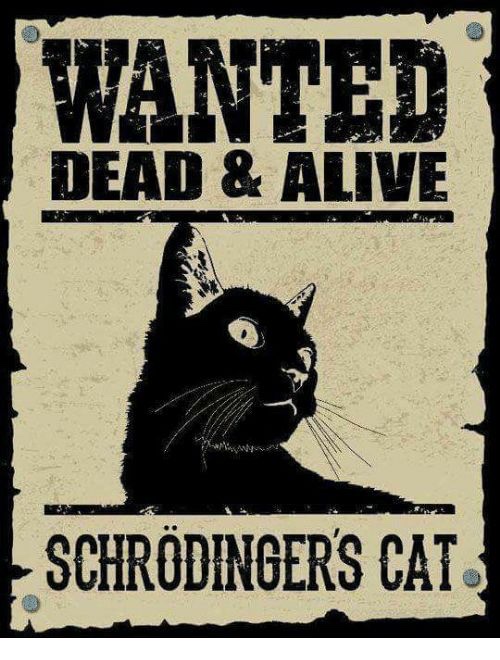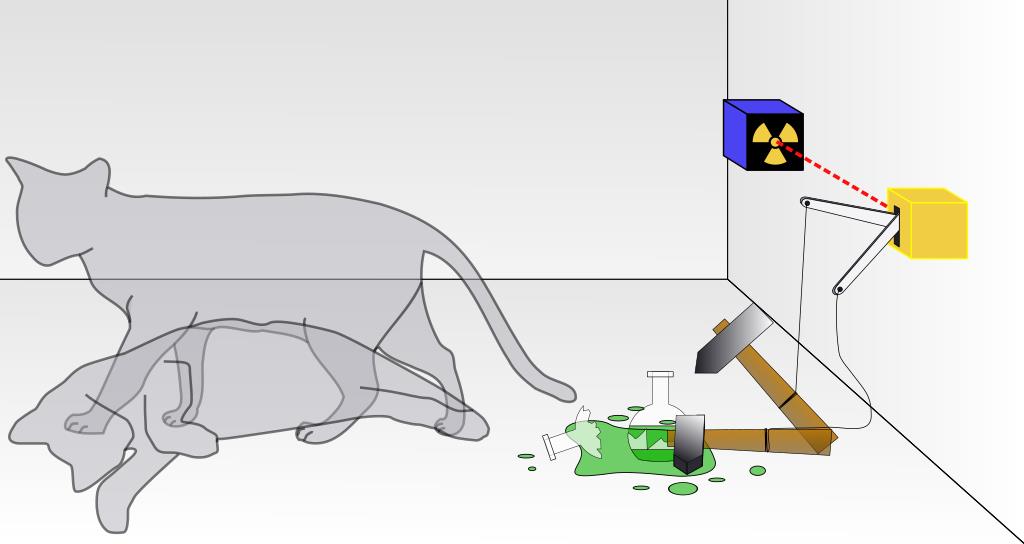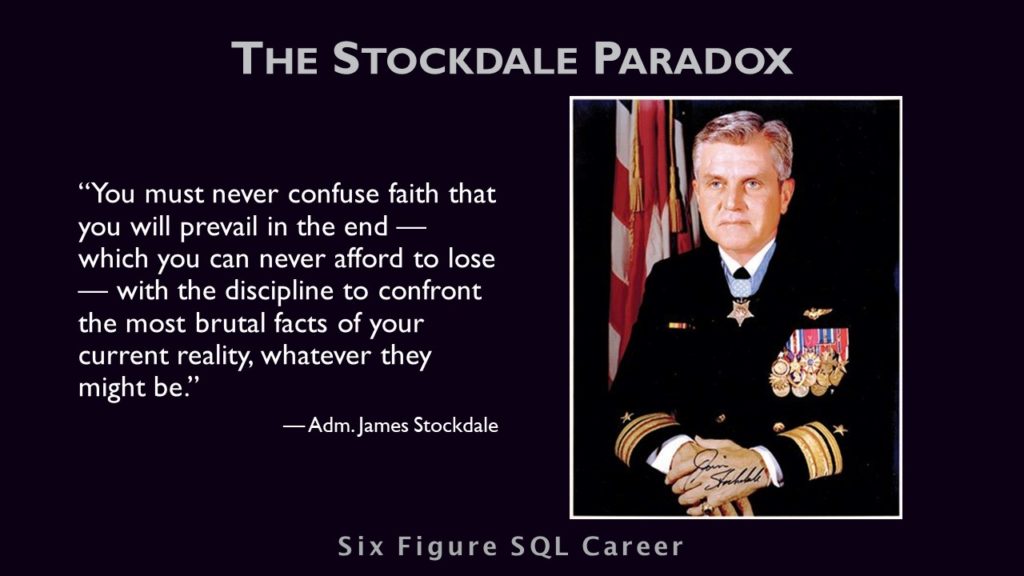
I haven’t owned a television for the last fifteen years.
Call it an odd twist of fate, but I was gradually weaned off of television since college. A lot of people, especially in the younger generation, find the concept of life devoid of TV as inconceivable.
However, instead of television, I do watch a lot of YouTube, especially by independent content creators covering diverse fields such as pop culture, Slavic hardbass music, law, and cooking. And since the Amber Heard/Johnny Depp trial, I’ve been watching a lot of livestreams about the entertainment industry.
And one metaphor that’s been popping up lately is the analogy of Schrödinger’s Cat.
Schrödinger’s Cat is a famous thought experiment in quantum physics. A cat is placed in a closed box, along with a vial of poison, a radioactive souce, and a Geiger counter attached to a hammer. When the source emits radiation, the detector breaks the vial, releasing poison gas that kills the cat.
However, because of the quantum theory of indeterminacy, it’s unknown when the radiation will be emitted. After a long enough time, indeterminacy asserts that the cat can be both alive *and* dead inside the closed box.

But once you open it, the cat is *either* definitely alive *or* definitely dead. In other words, once you observe the cat, it is committed to one or the other.
A watched pot never boils, but an unwatched cat lives and dies all at once.
The thought experiment was devised by Erwin Schrödinger, an Austrian physicist writing a response to a discussion with Albert Einstein on quantum mechanics. Since the end of the 19th century, physicist had been noticing that subatomic particles could exist in two different states. For example, light can act like a particle or a wave, depending on certain conditions within any given scenario. It’s only when the particle is observed (as through an experiment) that the particle exists in a single state.
(If you don’t understand what’s going on so far, you’re in good company. After three semesters of quantum physics, the only thing I learned is that nobody really understands quantum physics, at best they know how to make the math work.)
You really don’t have to be a nuclear physicist to understand quantum superposition, though. All of us, I’m sure, know that one smartass who, when asked to choose between “A” or “B”, responds “yes.”
(And to those of you who know me well: shut up.)
The truth is, something existing in diametrically opposed states at the same time, happens constantly in our headspace. Our minds are like a river, and the flotsam floating on the surface are our thoughts: positive, negative, and really weird crap that doesn’t matter at all.
However, whatever thoughts you give voice to is what comes to be. Your reality is Schrödinger’s cat. Your brain is the closed box. Your mouth opens the box.
Now here’s where I see a lot of people get it all wrong: they call it as they see it.
They see what is directly in front of their eyes and give voice to the thoughts that match up with it. Thank you, Captain Obvious.

But by giving voice to what they see, they reinforce the reality before their eyes.
And most of what we see is bad.
During a brief stint in marketing, one thing I learned is that people are more motivated by a fear of loss than a desire for gain. There are plenty of psychological studies that back this up. (For example, this one.)
To be fair, there’s a good reason for this. If our ancestors living on the savannah didn’t pay attention to bad news, we wouldn’t be here.
Unfortunately there are many who have figured out how to weaponize our threat detection systems against us. The sales experts who taught me marketing understood this.
So does the mainstream media. Why do you think most of the news is bad? If it bleeds, it leads.
Previously I had mentioned about the Red Pill meme, where one awakens to the unpleasant reality they’ve been previously denying. One of the dangers of such a rude awakening is, by seeing the bad, you wrongly believe that everything is bad, and there’s no hope for a better life.
This is called taking the Black Pill.
Sometimes, taking the Black Pill is even worse than the Blue Pill. At least with the Blue Pill you have the delusion that things are OK. With the Black Pill, even that is taken away from you.
Some sociopathic individuals even go as far as to convince you that what you’re seeing is wrong. This is where the term gaslighting comes from.
The book of Jeremiah has a good summary of what blackpillers are like:
For he shall be like a shrub in the desert,
And shall not see when good comes,
But shall inhabit the parched places in the wilderness,
In a salt land which is not inhabited.
—Jeremiah 17:6 (NKJV)
There is nothing more wretched than being a blackpiller. Even when the good comes, they don’t see it.
If you ever realize that one or more of your “friends” is a blackpiller, I strongly advise you to do everything you can to cut them out of your lives. Optimism is as caustic to a blackpiller as holy water is to a vampire. They will betray you the same way that Cypher betrayed Neo.
It doesn’t have to be this way. Like I said before, Schrödinger’s cat is both alive and dead inside the box. The good news, you can choose whether the cat lives when you open it.
This is the White Pill. Waking up to the ugly truth, yet still believing that the best is yet to come.
I understand, that’s hard to do when you’re surrounded by bad news all around. How do you believe in the best, when faced with the worst?
Ask Vice Admiral Stockdale.

James Stockdale was a Navy pilot during the Vietnam War. He was shot down and captured as a prisoner of war. Taken to the infamous Hanoi Hilton prison, he was brutally tortured every day for seven years. He had no reason to believe he’d ever leave Vietnam alive.
Yet he did. He came home, became an admiral, and at one point was a candidate for Vice President of the United States in 1992.
How did he do it? He believed that he would return one day, yet at the same time he did what he had to do to survive the harsh day-to-day.
This is the Stockdale Paradox: to believe in the best in the long run, yet deal with the worst in the short term.
Stockdale’s paradoxical mindset is a stark contrast to the other POWs who didn’t make it. They had the long-term optimism, but not the short-term persistence. They held out hope they would be home by Thanksgiving, by Christmas, by Easter. And when Thanksgiving, Christmas, and Easter came and went, several times, and they were still in the Hanoi Hilton, they ran out of hope and died of a broken heart.

This is something I learned to deal with when I switched careers from manufacturing to coding. I was deep in debt, working two jobs, and also learning to code. Those were three of the worst years of my life. I believed that I could make the switch, and now I’m living a life my pre-coding self could only dream about. But for three long years I had to deal with each day as it came.
Here’s how Jeremiah describes the White Pill:
For he shall be like a tree planted by the waters,
Which spreads out its roots by the river,
And will not fear when heat comes;
But its leaf will be green,
And will not be anxious in the year of drought,
Nor will cease from yielding fruit.
—Jeremiah 17:8 (NKJV)
Admiral Stockdale understood this point innately. Even in the worst days of his captivity, he was not anxious nor afraid when the torture came every morning.
Taking the White Pill is as simple as opening your mouth. Open your mouth, and let the live cat come out. You have the power to bring good things into your life, just by saying it.
This is known as the practice of affirmations. Lots of people, including cartoonist Scott Adams, talk show host Oprah Winfrey, and actor Jim Carrey have used affirmations to build their way to success.
You can too. Simply write down several (not too many, but definitely more than one) positive things you want to see happen in your life. Every morning, speak them out loud so you can hear them.
It won’t happen overnight. But you’ll be pleasantly surprised what happens over the course of a year or two.